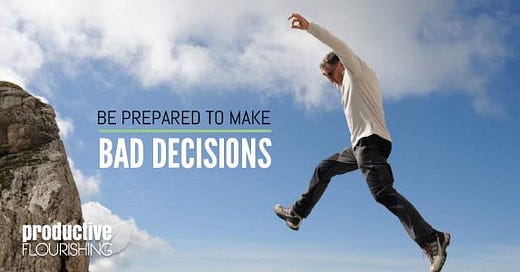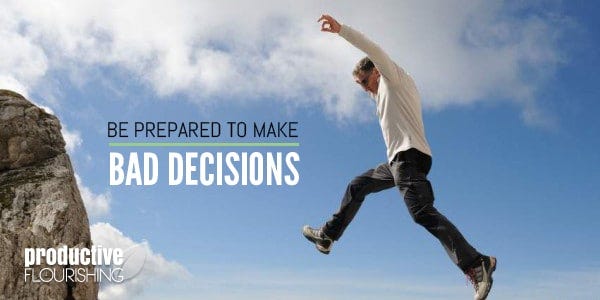Be Prepared to Make Bad Decisions
Embracing the fact you'll inevitably make bad decisions makes it easier to decide early and often; which in turn limits decision fatigue.
I've been thinking a lot about planning, decision-making, and execution lately. Okay, I always think a lot about those topics, but I've been thinking about them even more than usual.
You've no doubt heard someone — maybe me or Seth or other tributes to failure — encourage you to fail fast and fail often if you want to be successful. Fear of failure keeps so many people from actually starting the projects that would lead to them succeeding. Since you have to start to finish and you have to finish to succeed, the fear of failing ends up being a self-fulfilling prophecy.
Over time it's become more obvious to me that this counsel also covers making bad decisions. It's not just that you have to embrace making a good decision and having the failure come up in the execution, but, rather, you have to be prepared to make bad decisions in the first place.
Here's the bottom line: if you're not making bad decisions, you're not making enough decisions. (Tweet this.)
Part of the change-making journey is learning to make decisions with incomplete information, time, and resources.
What it takes practice to see is that most of the time, more of those items actually don't help the decision get made. In fact, they can make it harder to make the decisions that need to be made, as more information, time, and resources often means you just have more possibilities to work through.
There's a big gap between the inputs — information, time, and resources — to your decision-making process and the output of that process. More experienced changemakers jump that gap quicker and usually with better success, and know how to tuck and roll and keep their eyes forward when they do make bad decisions.
As your work gains momentum, you'll have to make more decisions precisely because the scope and visibility grow. If you haven't worked your way through learning to make good decisions and recovering from bad ones when you're starting out, it's going to be much, much harder to make those decisions when people are watching and the decisions have a bigger impact.
Just as you might be disadvantaged in a sense by experience, perspective, and resources — but you’ll be blessed if you can create a safer sandbox to make bad decisions. Would you rather make a bad decision when there are three people involved who know or when there are 300,000?
As much as we may not like it, we're hard-wired to learn more from mistakes than we are from successes. A corollary to that is that we only learn to become successful by failing. Hence the "fail fast, fail often" thing.
Just in case this is all too theoretical, I'll make it clear that you'll:
Hire the wrong teammate and then have to let them go
Start using the wrong tech solutions over and over again as you learn which ones actually work
Ally with the wrong partner and get burned
Market a product, service, or event that no one (or almost no one) buys
Talk to a big name and look like a fool
Give a talk that doesn't land
Create what feels like 99 pieces of crap for 1 masterpiece
Pay the wrong amount for taxes and have a bright, sunny, and cheerful mid-April day go dark very quickly
Start a nine-month campaign and find out three months into it that it's the wrong campaign
[Insert whatever consequence of a bad decision that most stings you]
It's not a rosy picture, I know, but I'd rather tell you the whole truth rather than just the pretty sides. Through my years of advising people, I've learned that the uglier truths that aren't being shared cause more suffering and inaction because it's so easy for people to assume that the inconvenient truths that are challenging them are doing so just because they're inadequate or stupid. It's not just you.
I'm obviously not encouraging you to willfully make bad decisions, nor am I encouraging you to not endeavor to get better at it. It just so happens that to get better at it, you have to be prepared to make some bad decisions.
A significant upshot to this that embracing the fact that you'll make bad decisions will make it easier to decide early and often, which in turn will limit your decision fatigue significantly.
In the end, it can be hard to tell what's a "bad" decision and what's a "good" decision. In one slice of time or one perspective, things appear one way. In a later slice of time or different perspective, they appear a different way. "Never count a man happy until the end of his days," the Greeks used to say, and the same truth applies here.
Think about a decision you're stalled on right now. Do you need more inputs or do you just need to jump the gap already? Get real and get it done.





